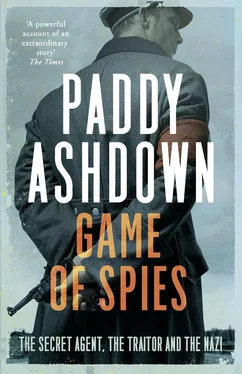In early 1942, the eight students caught the train north for Scotland and four weeks’ intensive training at Meoble Lodge, beside Loch Morar in Inverness-shire. Here, where moor and mountain sweep down to the back door, they marched long distances carrying heavy loads, spent nights in the open under rough shelters made of bracken and fir branches, learnt how to set a snare for rabbits and how to skin, gut and cook them afterwards. Two ex-Shanghai policemen taught them how to kill a man noiselessly with the SOE’s specially designed fighting knife, and an ex-chartered accountant showed them how to pick a lock and blow a safe. They also learnt the strange artefacts and sacred rituals of explosives: how to place the primer, just so; how to crimp (but gently) one end of the fuse in the detonator so it wouldn’t pull out, and how to scarf the other end at an angle, waiting for the match. How to light it, even in a gale, by holding the match end against the scarfed face of the fuse and striking it with the box, rather than the other way round. Why, with the fuse lit, you should always walk away, never run.
Parachute training at Ringway near Manchester followed, after which, in early May, Landes and his colleagues attended SOE’s ‘finishing school’ at Beaulieu, Hampshire. Here they learnt, among other things, codes and cyphers; disguise; how to follow someone and know if you were being followed; how to hide in a city; and how to place an explosive charge in just the right manner to cut a rail, slice through a bridge girder or blow the giant flywheel off a power station turbine, causing a hurricane of damage to everything it careered into.
After Beaulieu, most of Landes’s colleagues were given leave, while waiting for an aircraft and a full moon to parachute into France. In Claude de Baissac’s final report he was assessed as ‘an excellent operator’ destined for leadership. Not seeing the same qualities of ‘leadership’ in Landes, SOE marked him out for a radio operator and sent him to their wireless school at Thame, near Aylesbury. Here he met another fellow student, destined to join him in France. Gilbert Norman, also an ex-public school boy, was an imposing figure whose regular features, permanent suntan and moustache gave him the air of an actor who specialised in playing cads – or perhaps army captains – in a seaside repertory company. In fact, he was a chartered accountant from Llandudno. In July 1942 the two men passed out as fully qualified SOE wireless operators.
Roger Landes had done well. ‘He has the eye of a marksman … works well with others … liked for his keenness … very fit and tries hard … did exceptionally well on his own,’ his trainers wrote on his various reports: ‘a pleasant little man who takes great interest and trouble in what he does …’. Of all Landes’s attributes it would be his ability to work alone and his unobtrusiveness which would make him a truly great secret agent.
But Roger Landes was now much more than the sum of his good reports.
He had been transformed – and he had transformed himself – from a young Jewish refugee from Paris, working as an architect’s clerk in the LCC, into a fully capable secret agent and radio operator, ready to take the fight to the enemy in occupied France. To be sure, he still looked as he had always done: small, pleasant, unremarkable. But inside, he was now something completely different. Something hard, uncompromising, focused – even a little cold; always alert, always suspicious, always watchful. Above all, he was confident of his own strength and his ability to survive and to endure.
Конец ознакомительного фрагмента.
Текст предоставлен ООО «ЛитРес».
Прочитайте эту книгу целиком, купив полную легальную версию на ЛитРес.
Безопасно оплатить книгу можно банковской картой Visa, MasterCard, Maestro, со счета мобильного телефона, с платежного терминала, в салоне МТС или Связной, через PayPal, WebMoney, Яндекс.Деньги, QIWI Кошелек, бонусными картами или другим удобным Вам способом.












